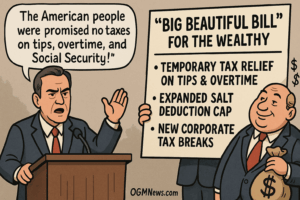Judge Carl Nichols has ordered Steve Bannon, former advisor to Trump, to report to prison on July 1st, 2024, to begin serving his four-month sentence for contempt of Congress. This ruling comes after an appeals court confirmed Steve Bannon’s guilt last month, upholding his conviction for defying a subpoena from the House January 6th committee. Steve Bannon was found guilty of refusing to hand over documents related to efforts to overturn the 2020 election, despite claiming protection under Donald Trump’s executive privilege.
U.S. District Judge Carl Nichols granted the request from prosecutors, ruling that the appeals court has cleared up any outstanding legal questions. This decision marks a significant milestone in the ongoing legal battle, ensuring that Steve Bannon will face consequences for his actions. As Steve Bannon prepares to serve his sentence, this ruling serves as a reminder of the importance of complying with legal requests and the consequences of defying the law. The outcome of this case will have significant implications for future legal proceedings related to the January 6th committee’s investigation.
Judge Carl Nichols Grants Prosecutors’ Request
U.S. District Judge Carl Nichols, a Donald Trump nominee, has granted prosecutors’ request to compel Steve Bannon to begin serving his sentence, marking a significant development in the high-profile case. This decision follows an appeals court’s ruling last month upholding Steve Bannon’s conviction, and paves the way for him to report to prison on July 1st, 2024. Despite Steve Bannon’s lawyers having time to appeal, Judge Carl Nichols’ ruling is a considerable setback for his legal team, which had argued that the appeal process was ongoing.
Judge Carl Nichols’ decision is a crucial milestone in the legal proceedings, as it reaffirms the legitimacy of Steve Bannon’s conviction. By ruling that the appeals court has resolved any outstanding legal questions, Judge Carl Nichols has cleared the path for Steve Bannon to begin serving his sentence. This outcome highlights the consequences of defying the law and the importance of accountability, and will likely have significant implications for future cases related to contempt of Congress. As the legal process unfolds, Judge Nichols’ decision will be closely watched by observers and experts alike.
Steve Bannon’s Conviction Upheld by Judge Carl Nichols
In a significant ruling, an appeals court has upheld Steve Bannon’s conviction for contempt of Congress, paving the way for him to report to prison. Steve Bannon was found guilty of defying a subpoena from the House January 6th committee and refusing to hand over documents related to efforts to overturn the 2020 election. The appeals court decisively rejected Steve Bannon’s claims of executive privilege, ruling that his arguments were without merit.
The appeals court’s decision marks a major victory for the House January 6th committee, which has been tirelessly investigating the events leading up to the Capitol riot. Steve Bannon’s conviction sets a crucial precedent for future cases involving contempt of Congress, demonstrating that such actions will not be tolerated. This ruling reinforces the importance of accountability and the rule of law, and will likely have significant implications for ongoing and future investigations.
Executive Privilege Claim Rejected
Steve Bannon’s claim of executive privilege has been rejected by Judge Carl Nichols, who ruled that the appeals court has cleared up any outstanding legal questions. Steve Bannon had argued that he was protected by Donald Trump’s assertion of executive privilege, but the judge found this argument without merit.
The rejection of Steve Bannon’s executive privilege claim is a significant blow to his legal team, which had hoped to use this argument to overturn his conviction. However, the judge’s ruling paves the way for Steve Bannon to report to prison on July 1st.
Prison Sentence Looms for Steve Bannon
Steve Bannon is scheduled to report to prison on July 1st, 2024, to begin serving his four-month sentence for contempt of Congress, following a federal judge’s order upholding his conviction. Despite his lawyers having time to appeal, the judge’s ruling clears the way for Bannon to begin his sentence, marking a significant consequence for his refusal to comply with the House January 6th committee’s subpoena. This outcome demonstrates the seriousness with which the legal system views contempt of Congress and sets a crucial precedent for future cases.
Steve Bannon’s prison sentence serves as a stark reminder of the importance of complying with legal requests and the consequences of defying the law. His case has significant implications for ongoing and future investigations, reinforcing the principle of accountability and the rule of law. As Steve Bannon prepares to serve his sentence, his case will be closely watched by legal experts and observers, serving as a benchmark for future cases involving contempt of Congress.
Legal Ramifications of Steve Bannon’s Conviction
Steve Bannon’s conviction for contempt of Congress has significant legal ramifications, both for him and for future cases involving executive privilege. The appeals court’s decision to uphold his conviction sets a precedent for future cases, making it clear that claims of executive privilege are not absolute.
Steve Bannon’s case also highlights the importance of complying with congressional subpoenas. His refusal to hand over documents and testify before the House January 6th committee resulted in his conviction and prison sentence, serving as a warning to others who may consider defying congressional subpoenas. There was a problem generating a response. Please try again later.














